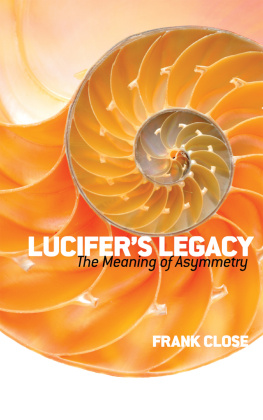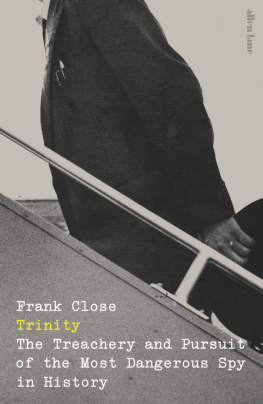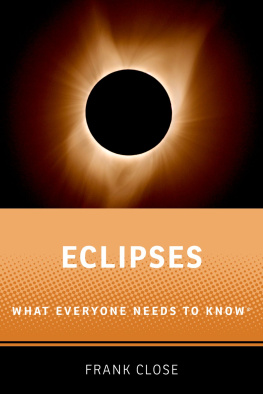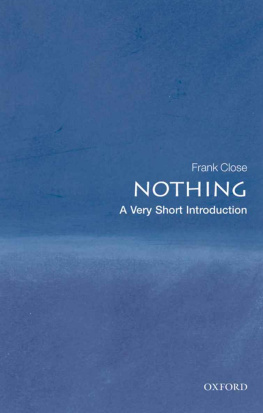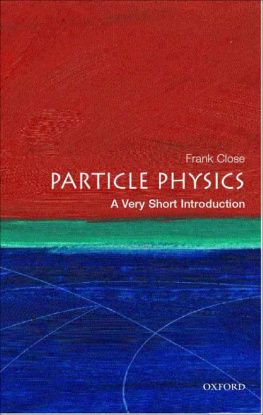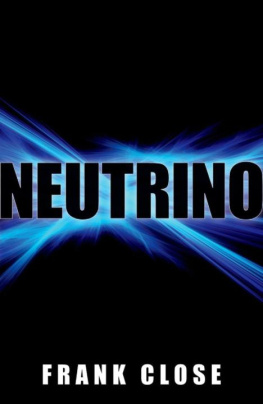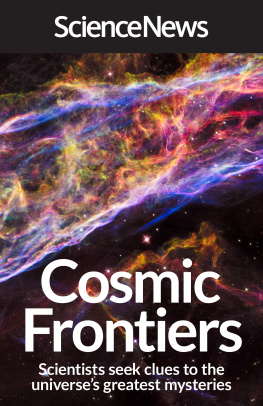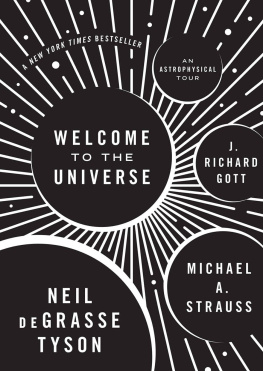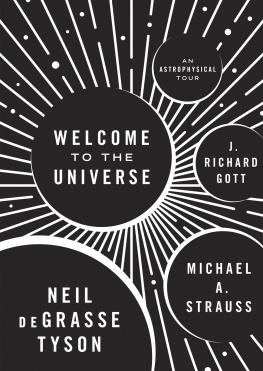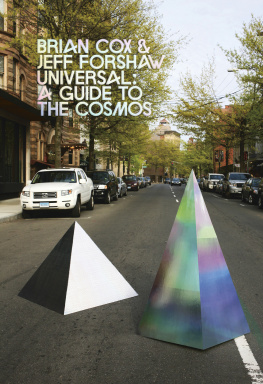
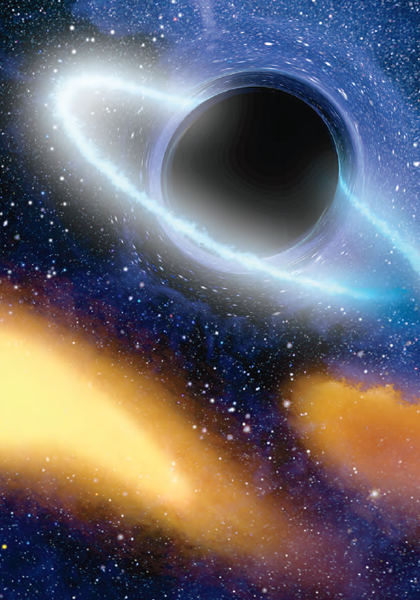
THE VOID

Frank Close


New York / London
www.sterlingpublishing.com
For Lizzie and John
STERLING and the distinctive Sterling logo are registered trademarks of Sterling Publishing Co., Inc.
Library of Congress Cataloging-in-Publication Data Available
10 9 8 7 6 5 4 3 2 1
Published by Sterling Publishing Co., Inc.
387 Park Avenue South, New York, NY 10016
Published by arrangement with Oxford University Press, Inc.
Original text Frank Close 2009.
Illustrated edition published in 2010 by Sterling Publishing Co., Inc.
Additional text 2010 Sterling Publishing Co., Inc.
Distributed in Canada by Sterling Publishing
c/o Canadian Manda Group, 165 Dufferin Street
Toronto, Ontario, Canada M6K 3H6
Book design: The DesignWorks Group
Please see picture credits on page 183 for image copyright information.
Printed in China
All rights reserved
Sterling ISBN 978-1-4027-7538-3
For information about custom editions, special sales, premium and
corporate purchases, please contact Sterling Special Sales
Department at 800-805-5489 or .
Frontispiece: This artists concept shows a supermassive black hole at the center of a remote galaxy digesting the remnants of a star. The area around the black hole appears warped because the gravity of the black hole acts like a lens, twisting and distorting light.
CONTENTS
I AM GRATEFUL TO MY EDITOR Latha Menon for encouraging me to research and write about nothing, and to Ian Aitchison, Ben Morison, and Ken Peach for their comments that helped me to produce this something.
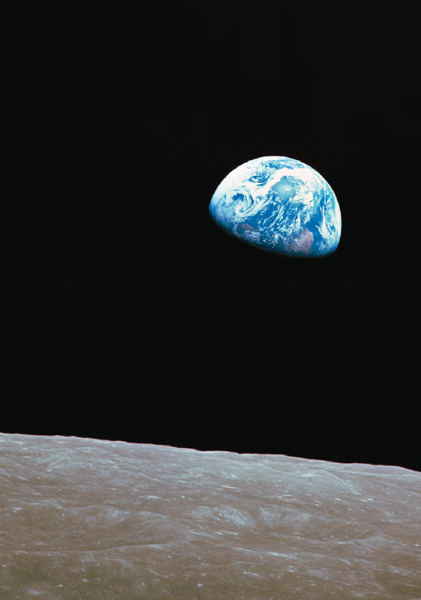
Earthrise. This photographthe first image of our planet from another worldwas taken by U.S. astronauts on board the Apollo 8 spacecraft as they orbited the moon on December 24, 1968.
ONE
Much Ado About Nothing

AT SOME EARLY STAGE IN OUR lives most of us are suddenly hit by the question: Where did everything come from? We may also wonder where our conscious self was before our birth. Can you identify your earliest memory? When I first started school, I had clear memories of the previous two or three years, especially of summer holidays at the seaside, but when I tried to recall earlier events the visions became more hazy, disappearing into nothingness. I was told that this was because I had only been born five years previously, in 1945. Meanwhile my parents spoke of a war, and of things that had happened to them before the war, but it all meant nothing to me. The world that I knew had not existed then and appeared to have been created at my birth, filled with ready-made parents and other adults. How could they have existed before my conscious universe?
The weird void that was everything until 1945 continued to trouble me; then in 1969 an event occurred that was to give me a new perspective on this problem.
Apollo 10 was skimming just above the surface of the Moon, which the marvels of communications were revealing as a desolate wasteland of rock and gravel. This desert of gray dust stretched to the lunar horizon, which arced against a black void that was dotted with occasional stars, lifeless balls of hydrogen that had erupted into light. Suddenly, into this barren picture arose a beautiful blue jewel with white clouds and green continents of vegetation: for the first time humans witnessed Earthrise. There is one place at least in the universe where there is life, collections of vast numbers of atoms that have become organized such that they are self-aware and can gaze into the universe with wonder.
What if there were no intelligent life? In what sense would any of this exist if there were no life to know it? Ten billion years ago it is possible that that is how it was: a lifeless void littered with clouds of plasma and barren lumps of rock orbiting in the vastness of space. Although this epoch of pre-consciousness contained no life, and must have been like some grand extension of my egocentric pre-1945 universe where gravitys dance played on without anyone being aware, nonetheless the same atoms that existed back then are what we are made of today. Once inert, complex combinations of these atoms have become organized to create what we call consciousness and are able to receive, from far across the universe, light that had set out in those earlier lifeless times. We in our now can bear witness to that earlier lifeless epoch, which after the event gives it some sort of a reality. We have not been created out of nothing, but from a primeval ur-matter, atoms formed billions of years ago that have for a brief while been gathered into collections that think they are us.
This led to my final question: What if there were no life, no Earth, no planets, Sun, or stars, no atoms with the potential to be reorganized into future somethings; what if there were just emptiness? Having removed everything from my mental image of the universe, I tried to imagine the nothing that remained. I discovered then what philosophers have known throughout the ages: It is very hard to think about the void. As a naive child I had been wondering where the universe had been before I was born, now I was trying to imagine what there would be had I not been born at all. We are the lucky ones for we shall die, as there is an infinite number of possible forms of DNA all but a few billions of which will never burst into consciousness. What is the universe for the never-to-be-born or for those now dead? All cultures have created myths about those that have died, so difficult is it to accept that consciousness can just disappear when the oxygen pumps fail to power the brain, but what means consciousness for those combinations of DNA that never started, nor ever will be?
It is as hard to understand how consciousness emerges and dies as it is to comprehend how something, the stuff of the universe, erupted out of nothing. Was there a creation or was there always something? Could there even be nothing if there were no one to know there was nothing? The more I tried to understand these enigmas, the more I felt that I was at the edge of either true enlightenment or madness. Years later, having spent my life as a scientist trying to understand the universe, I have returned to such questions and taken a journey to find out what answers there are. The result is this little book. I am flattered to know that in having asked such questions, I am in good company, as in one form or another they have been asked throughout the ages by some of the greatest philosophers. Furthermore, no answer has been agreed. At various times, as one philosophy has dominated over others, the received wisdom also has evolved. Can there be a vacuum, a state of nothing? Like questions about the existence of God, it seems that the answers depend on what you mean by nothing.
In addressing these questions through the power of logic the philosophers of ancient Greece came to contrary opinions. Aristotle claimed that there could not be an empty place. This was even raised to a principle that Nature abhors a vacuum; what this means and why it was believed for 2,000 years is one of the first questions that I shall address. In short summary we will see that it was not until the seventeenth century, with the emergence of the experimental method, that Galileos students showed belief in the abhorrence of a vacuum to be due to a misinterpretation of phenomena; the apparent abhorrence was the result of 10 tonnes of atmosphere weighing down on each square meter of everything on the ground, squeezing air into every available orifice.
Next page

